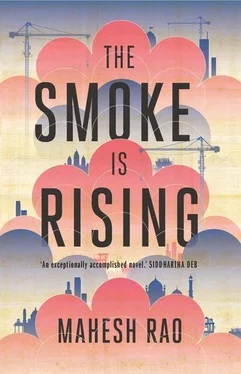Mala’s days at RMV College seemed to sound a knell towards an indeterminate future. She would wake each morning at half past five, bathe, light the two small ghee lamps in front of the picture of Ganesh and pray solidly for half an hour. Before leaving for college she would engage in a couple of hours of consolidation, going over the previous day’s lectures and diligently asterisking key points with an encircled ‘NB’. Later she would arrive at the wrought-iron gates of the college, her rucksack crammed with texts on corporate accounting and marketing principles, her notebooks colour-coded and covered with the incontinent loops of her handwriting. In the last month before examinations she would sit on the back steps of the house in the tawny haze of early morning, her lips mouthing the knowledge that had to be jammed into her brain, a bowl of almonds soaked in milk cradled in her lap.
At the end of her final year the results were as expected: undistinguished but not mortifying.
‘Anyway, she is not going to head off to be a collector. It will do,’ her elder sister Ambika had said.
A few years earlier Ambika had graduated with a first class degree in engineering and was now married to a surgeon who called her ‘white white face’. There had never been any doubt that Ambika would attract a creditable alliance. Even as a fifteen-year-old, her face had frequently been compared to the carved idol of the deity at the Mahagauri temple in Konnapur. Added to her milky skin and expressive eyes, these features meant that Ambika was married by the time she was twenty-three. True that by then she had begun to put on the extra weight, but what did it matter? Once she was married, she was married. Now that her husband had set up his own nursing home she was actively involved in its administration and was hardly ever seen in Konnapur. Her brisk efficiency kept the forty-bed facility running smoothly and the couple had plans to open a new wing for gynaecological services.
As Ambika’s husband liked to point out: ‘There is no boom and bust in life and death.’
A couple of months after the graduation ceremony, Mala began to dedicate herself to the process of finding a husband, putting in the same kind of studious preparation that had structured her college days. She kept a watchful eye on her weight, stayed out of the sun and continued praying. Every morning she applied a gram flour and rose-water face pack and twice a week massaged her scalp with a paste made from six tablespoons of yoghurt, half a banana, two teaspoons of honey and a tablespoon of lemon juice. On the day that her photos were to be taken, she had a special hibiscus facial at Soundharya Beauty Parlour and her hair was carefully blow-dried for the first time, notwithstanding Rukmini’s firmly held belief that hairdryers only led to baldness. The photographer was encouraging: he was confident that she would find a wonderful life partner within weeks. He assured Rukmini that he had developed a sixth sense in such matters, having been in the business for over thirty years.
The marriage broker that Rukmini visited was less conciliatory.
‘Look madam, I don’t cheat my clients, I don’t make false promises, I don’t say that the sun rises in the west. I have to give you an honest assessment. She doesn’t have height, only a B.Com, colour okay, features passable and — I am sorry, but I am only repeating what you have said — there is no question of much property or money. In our community, the question of dowry does not arise, thank God, but still, people look at these things. And you want what everyone wants: a good-looking boy from the right caste, with a good education, good family background, good job, good prospects and a good horoscope match. At the moment, I don’t know; you will just have to leave it with me. Let’s see what happens,’ she had said, scrutinising Mala’s photos with a practised severity.
Rukmini had left the marriage broker’s house in a state of deep agitation. In her world people tended to speak in practised allusions, cloaking barbed truths in a mantle of assurances. Her throat contracted sharply as she realised that her second daughter faced an unforgiving few months.
The reality was that it took nearly two years. By the time a distant relative had suggested Girish’s name, Mala’s photos had been circulated as far as Pune and Coimbatore.
‘A little puny.’
‘Not bad looking but her nose is pretty bulbous, no?’
‘The boy is too tall, see her height. It won’t look good.’
‘She’s fine, she’s nice; it’s just that he has seen someone that he really liked.’
‘Nothing doing.’
After a while, Rukmini simply stopped making the follow-up calls. She maintained a garrulous optimism for the benefit of her husband and daughters and was careful not to relay any adverse comments to them. The message she passed on was always that ‘something did not suit, you know what people are like, they are never straightforward.’
Babu had suggested that it would be good for Mala to find a different focus while they waited for marital matters to arrange themselves. A few weeks later she found a part-time job as an accounts assistant at a PUC college. On her second day there Mala discovered that any fiscal propriety enforced by the school board was a matter purely of historical interest. The college accountant to whom she had to report was rarely to be seen and a similar level of absenteeism flourished among the other members of staff and the students. Her mornings were spent in a dusty room at a desk supporting numerous ancient ledgers and what appeared to be a computer of similar vintage.
Mala dutifully turned up on time every day and left the office just before lunch. In the intervening hours there was not much to disturb her nervous ruminations. At that point the future seemed like a place of fantasy to Mala, peopled by spectres adrift in a nebulous realm of responsibilities. Occasionally a student would pop into the room with a query and then drift away. Some mornings Mala would copy type a few pages of a newspaper article or an old report and then, upon completion, erase all the words. Much of the time she looked out at groups of girls and boys in the compound who would congregate in the shade of a neem tree, framed by the jagged edges of the glass in the office’s broken window.
Months later, by the time talks had begun with Girish’s aunt, Mala had given up the job. She was more than willing to be guided in life by those better informed than her, but even she could see that there was absolutely no benefit to be gained from spending any more time in that sepulchral space. At that point Ambika had offered to step in and provide her with an administrative position at the nursing home. It would keep her from sitting at home and she might learn some new skills. But Rukmini had felt that Mala was better off at home in Konnapur where prospective husbands could meet her and her parents. It had become a habit not to ask Mala for her views. She had been denied the vernacular of agency for so long that her reticence merely glanced off the bulwark of parental concern.
The interest from Girish’s aunt came at an opportune time but it was not without its complications. The twelve-year age gap was hardly ideal and, crucially, Rukmini and Babu had wanted to know why Girish was not yet married. In theory, someone like him should not have had many problems finding a girl, and yet there he was, a man single at the age of thirty-five. Was there some health condition in the family, a long-term girlfriend who had finally spurned him or, God forbid, a foreign wife in America? The family intermediary had not been able to ascertain the precise reason for Girish’s single status. She could only surmise that there might have been some sort of romantic disappointment but the crucial factors were all in place: he was tall and slim, had excellent antecedents, an exemplary academic record and a good job at a state electricity distribution company. Tragically, his mother had drowned while on a pilgrimage and his father had since moved to an ashram in Kerala. There was one brother, a wealthy businessman, also in Mysore, and a scattering of decent relatives elsewhere. Apart from his age there was nothing to indicate that he was not a good match. Besides, Mala had been sitting at home for nearly two years now. The family intermediary was certainly not the kind of person who would presume to tell them what to do. She had simply presented the facts.
Читать дальше












